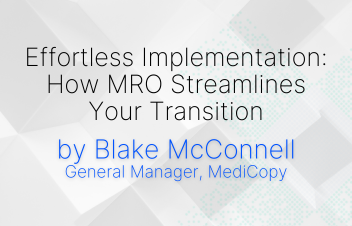As healthcare moves deeper into the digital age, the seamless exchange of clinical data between health systems and payers has become increasingly critical. Earlier this year, MRO in collaboration with the College of Healthcare Information Management Executives (CHIME), conducted an extensive survey of over 180 leaders from health systems across the U.S. The survey aimed to better understand the challenges surrounding bidirectional clinical data exchange, specifically across seven key use cases: prior authorization, risk adjustment, care management, quality reporting and submission, claims adjudication, claims appeals, and payment integrity audits.
The resulting report sheds light on both the technical and operational hurdles these leaders face when sharing clinical data with payer partners and emphasizes the growing need for modernized workflows in data exchange. Two use cases in particular — prior authorization and risk adjustment — emerged as key outliers, suggesting the need for health systems to focus on these areas as they refine their data exchange capabilities.
Key Findings and Challenges in Clinical Data Exchange
The survey findings reveal widespread agreement among health system leaders regarding the importance of efficient data exchange with payers, but also highlight four key challenges:
- Operational Complexity: Health systems grapple with the complexities of managing data requests from payers, which often demand significant time and resources. One critical area of concern is determining who within a health system is responsible for managing these requests — a challenge exacerbated by the vast array of payer requests.
- Access to Electronic Health Records (EHRs): A point of contention is how much access payers should have to a provider’s EHR system. There is variability in how health systems approach this, indicating a lack of standardized practices.
- Automation and Third-Party Solutions: With the increasing volume of data requests, health systems are becoming more open to using third-party solutions to automate clinical data exchange. The report notes that automation is key to reducing administrative burdens and improving efficiency. However, health systems must ensure that these solutions align with stringent data governance and security standards.
- FHIR Adoption: Fast Healthcare Interoperability Resources (FHIR) application programming interfaces (APIs) are becoming a favored solution to fulfill payer data requests. The report finds that health systems are gradually adopting FHIR standards to streamline data exchange, although the pace of adoption varies across systems.
Anomalies in Prior Authorization and Risk Adjustment
While most respondents aligned on challenges and solutions across the seven use cases, the survey identified notable anomalies in prior authorization and risk adjustment from direct payer access. These two use cases were reported to be more complex and less standardized than others.
- Prior Authorization: Health systems often struggle with the time-consuming process of obtaining prior authorizations from payers. The manual nature of these workflows can lead to delays in patient care and increased administrative costs. Solutions that can streamline and automate prior authorization processes will likely be critical for reducing these burdens.
- Risk Adjustment: In the realm of risk adjustment, data accuracy and timeliness are crucial. The survey indicated that health systems are finding it difficult to ensure that the data they exchange with payers for risk adjustment purposes is up-to-date and complete, often leading to downstream implications such as payer premium accuracy, payer-provider contracting, compliance, and security.
Given the unique challenges presented by these two areas, health systems and their vendor partners will need to focus on creating more efficient workflows and leveraging technology to improve data exchange processes.
MRO’s Role in Enhancing Data Exchange
The findings of this report underscore the importance of having a robust data exchange infrastructure, and MRO’s suite of solutions is positioned to address the challenges identified in the survey. MRO’s solutions support secure, compliant data exchange between payers and providers, with a strong emphasis on:
- Data Governance and Security: MRO’s solutions are designed to ensure that sensitive health information is safeguarded at all times. By enabling the exchange of only the minimum necessary data, MRO helps health systems stay compliant with healthcare regulations while protecting patient privacy.
- Reducing Complexity: MRO reduces the complexity of payer-provider data exchange by acting as a single data partner, capable of aggregating and standardizing data across diverse EHR systems. Currently, MRO exchanges data with over 200 payers daily. This improves data quality, creates transparency and reduces the administrative burden on health systems.
- Efficiency and Cost Reduction: By automating workflows and streamlining data exchange processes, MRO’s solutions help health systems reduce costs and administrative complexity, while also improving the accuracy and timeliness of the information shared with payers. Through the utilization of FHIR via our Clinical Data Exchange Platform (CDXP), MRO improves interoperability by standardizing medical record requests, efficiently releasing those records via auto-retrieval, all while maintaining regulatory compliance.
Looking Ahead: The Path to Modernized Workflows
As health systems continue to navigate the challenges of clinical data exchange, it’s clear that modernization is not just desirable but necessary. The adoption of FHIR APIs and third-party automation solutions will be key to reducing the friction in payer-provider interactions. However, health systems will need to take a careful, deliberate approach to ensure that any new solutions align with their broader goals of enhancing efficiency, reducing costs, and improving patient outcomes.
With leaders in the industry like MRO providing the tools and frameworks to support secure, compliant, and efficient data exchange, the path forward is clear. By focusing on key areas such as prior authorization and risk adjustment, and adopting standardized technologies like FHIR, health systems can make significant strides in improving their data exchange workflows — ultimately benefiting both providers and patients alike.
To read the full CHIME report findings, click here.



